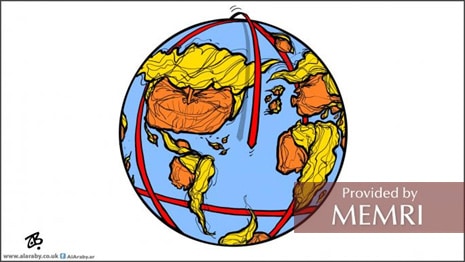Donald Trump’s victory in the U.S. presidential election sparked many reactions in the Arab and Muslim world. Many Arab leaders – particularly those of Saudi Arabia, Egypt, Jordan, the UAE, Iraq, Morocco, Lebanon, and the Palestinian Authority (PA) – praised Trump and looked forward to working with him during his second term in advancing stability and security in the Middle East.
The Arab press likewise published many reactions to Trump’s victory. Saudi articles called on him to work to bring an end to the bloodshed and wars in the Middle East; one even referred to him as “the savior” of the world and of the Middle East and as “the man who will make peace a reality.” Similarly, an Emirati journalist predicted that Trump will resume his cooperation with the moderate Arab countries and revive the Abraham Accords, while increasing pressure on Iran. An editorial in the Egyptian government daily Al-Ahram predicted that during his second term, Trump will focus on America’s rivalry with China and Russia and less on the Middle East, warning that ignoring the Middle East might endanger the interests and security of the United States. Conversely, the editor-in-chief of the London-based Qatari daily Al-Arabi Al-Jadid expressed pessimism and asserted that Trump’s reelection is a terrible nightmare that brings with it serious concerns.

Cartoon in Egyptian daily: "Trump in the White House" (Youm7.com, November 7, 2024)
The following are translated excerpts from these articles:
Saudi Daily Okaz: Trump's Arab And Muslims Voters Expect Him To End The Wars
The Saudi daily Okaz stated in an editorial: "In light of the wars [raging across the world], from Ukraine to Gaza and Lebanon – as well as the political and security tensions, regarding which the Democratic administration has failed to achieve any breakthroughs so far – the overwhelming victory of the Republican candidate Donald Trump comes at a time when the world needs decisive action and positions in order to put out the raging fires and stop the bloodshed, especially in the Middle East...
"[Trump’s] advisers must understand that the voters who brought him to the presidency, particularly those in America's Arab and Muslim communities, are waiting for his campaign actions and promises to become tangible facts on the ground, especially his determination not to wage wars but to work to end them, with emphasis on the need to end the wars in Gaza, Lebanon and Ukraine."[1]
Saudi Columnist: We Must Not Miss Rare Opportunities To Make Peace
Saudi columnist Muhammad Al-Sa'd wrote in the daily Okaz: "It was an American spectacle, but also a global and Middle Eastern one. Trump, who was despised by some Arab and Western organizations and nations that were taken in by the propaganda leading up to [his election] as president... became the man who will save the world from a possible nuclear war and save the Middle East from Sisyphean wars, and the man who enables [us] to dream and makes peace a reality.
"The important thing [today] is not for organizations and countries immersed in anarchy to pin their hopes on Trump and on his administration. [The important thing is] not to miss rare opportunities for peace that may never return, like the opportunity for peace offered by Bill Clinton in 2000, before he completed his term in the White House, along with Ehud Barak."[2]
Egyptian Daily Al-Ahram: Trump No Doubt Understands That Leaving The Middle East In A Vacuum Will Strengthen The Terror Organizations And Jeopardize U.S. Interests
The Egyptian government daily Al-Ahram stated in an editorial: "The issue of combating terrorism was at the forefront of Trump's election campaign, so he is expected to work for broader cooperation with the moderate governments in the [Middle East] region, which likewise seek to fight terrorism. It is known that Egypt, Saudi Arabia and the UAE lead these moderate forces, and Donald Trump will [therefore] work towards greater cooperation with them.
"The question is whether this cooperation will lead to arrangements, initiatives, and plans to resolve the Palestinian issue, which is in a difficult situation. Only time will tell. Some commentators speculate that Trump and his administration will focus primarily on the conflict in the South China Sea and on the rivalry with Russia... while their interest in the Middle East will wane.
"Generally speaking, Trump certainly understands that the Middle East cannot be left in a vacuum, which will increase the potential risk to American interests and make it easier for the terrorist organizations to operate – which, in principle, will be detrimental to U.S. national security, and Trump knows this very well."[3]
Emirati Journalist: Trump Is Expected To Renew His Relations With The Moderate Arab States, Revive The Abraham Accords, And Force Iran To Make Tactical Concessions
Emirati journalist Muhammed Faisal Al-Dosari wrote in his column in the London-based Emirati daily Al-Arab: "...In the Middle East, Trump is seen as a 'deal-maker' and therefore as a figure whose actions are hard to predict. [But] he is expected to work to tighten his relations with his traditional allies in the region, especially the moderate Arab states.
"The region will also witness a return to the Abraham Accords with Israel, which will put an end to the crises currently hanging over the region – in Lebanon, Syria, Gaza, Yemen and elsewhere. As for Iran, it will be in a difficult position, as its leaders understand that Trump's return could mean more pressure and sanctions [against their country], and perhaps even military threats that could endanger its nuclear program. However, Iran will continue to be driven by considerations related to its available military and economic power, which might force it to maneuver and make some tactical concessions, albeit without undermining the core of its regional strategy, especially its support for its local proxies in Iraq, Syria and Lebanon.
"Trump's return to the White House could lead many countries to reconsider their regional alliances. In the coming period, new alliances and blocs may emerge in an effort to address the growing concerns regarding the stability of the global order. Trump will face the challenge of maintaining a delicate balance between America's interests and the inclinations of his allies in the Middle East and Europe. He is expected to lean toward a policy based on deals and tactical alliances, which will increase the uncertainty in the international arena.
"Trump's victory presents a timely opportunity to reassess the American role in the international arena, but it also poses a significant challenge to a world that has become less stable and much more divided, with the international landscape marked by polarization and change. It is possible that Trump, with his unique approach and unconventional ways, will be able to achieve many effective outcomes. If he is able to make America great again, as he claims, this greatness will inevitably come at a steep price for the world, for it will leave its mark [by prompting] shifts in relations and alliances, in ways that will be difficult to control."[4]

Cartoon in Qatari daily Al-Arabi Al-Jadid: Trump's win will impact the entire world (alaraby.co.uk, November 6, 2024)
Editor Of London-Based Qatari Daily: Trumps' Return Is A Serious And Worrying Nightmare
Ma'en Al-Bayari, editor of the London-based Qatari daily Al-Arabi Al-Jadid, wrote: "...We all have experience with him. He lived in the White House for four years before Biden replaced him. [So] it would be fair to say that his return to the presidency of the world's most powerful country is a serious nightmare, for what we know about him is not reassuring, [but rather] worrying. This is not to say that the defeated Kamala Harris would have acted justly and fairly toward the world... But in the case of Trump and his expected administration, we are looking at a higher level of arrogance, Zionism and racism... The fact that Netanyahu was the first to congratulate the winning candidate, and boasted of 'the greatest comeback in history,' attests to the renewed alliance between the two, for they are friends, and will go to the greatest possible extremes in killing off the Palestinian issue and turning it into a matter of investments, as they tried to do with the plan Trump announced [during his first term] – the 'Deal [of the Century]' for peace in the region...
"[Some] Arab kings and presidents have expressed displeasure at the return of the 'orange man' to the global stage, but other Arab kings, princes and presidents – perhaps more of them – celebrated his return, because they were pleased when his previous administration brokered the normalization agreements and the Abraham Accords with Israel. They [now] expect him to offer [even] greater and clearer support for their action against political Islam, and they are pleased by his profound ignorance about regional issues and sensitivities...
"When [people] claim that Trump's second [term] will be somewhat different from his first, we are not so sure, although anything is possible... Before us is a man [characterized by] storms, recklessness, extremism, populism, hostility toward the press and its freedoms, and love for tyrants and dictators... Before us is Donald Trump. The name alone is enough to stir up whirlwinds of concern within us and [prompt us to take] every precaution..."[5]




